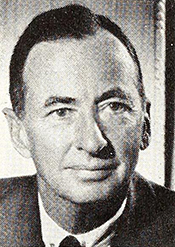6 July 1896–20 Jan. 1962

James Spencer Love, textile manufacturer and founder, president, and chairman of the board of Burlington Industries, was born in Cambridge, Mass., the son of James Lee and June Spencer Love. His father, a native of Gastonia, N.C., was assistant professor of mathematics, secretary of the Lawrence School of Science, and director of the summer school at Harvard University before he joined his son in business. His mother's family had strong ties with The University of North Carolina; his maternal grandfather was Professor James Munroe Spencer, and his maternal grandmother was Cornelia Phillips Spencer.
Love graduated from the Cambridge Latin School, received a B.A. at Harvard in three years, and studied for a year at the Harvard Business School. Joining the U.S. Army in 1917, he rose to the rank of major and served in the adjutant general's office of his division before leaving the service in 1919. He sought employment in Boston but, deciding opportunities would be greater elsewhere, moved to Gastonia, where his paternal grandfather, Robert Calvin Grier Love, and an uncle had pioneered in the textile industry. Love borrowed money to purchase the Gastonia Cotton Manufacturing Company in 1919. Three years later, he sold the land and the building and took the machinery to Burlington. There, supported by a $250,000 loan underwritten by the Burlington Chamber of Commerce, he opened a mill that originally employed two hundred people. Shortly afterwards, he decided to gamble on a new product, rayon. Throughout his business career, Love continued to be bold, expanding frequently and seeking new products even in the hard times of the 1930s.
Burlington Mills eventually became Burlington Industries, the largest textile manufacturing company in the world; in 1961 Fortune listed it as the forty-eight largest corporation in the United States in sales ($913 million). The company then had assets of nearly $607 million and plants in eighteen states and seven foreign countries, processing more than thirty-four man-made and natural fibers and employing 62,000 people.
Love, a Democrat, engaged in a wide range of business, political, and community activities. He was the director of the Textile Clothing and Leather Board of the War Production Board during World War II. He also was a director of the Carolina Cotton Manufacturers Association, Economic Club of New York, North Carolina Textile Foundation, National Safety Council, North Carolina Research Triangle Foundation, North Carolina National Bank, American Cotton Manufacturing Institute, and North Carolina Symphony Society, Inc. In addition, he was a member of the Anglo-American Productivity Council, Business Advisory Council of the U.S. Department of Commerce, Advisory Committee on Labor-Management Policy, Federal City Council of Washington, Ad Hoc Textile Research Committee of the National Academy of Sciences, National Research Council, and Visiting Committee of the Harvard Graduate School of Business Administration. He was a trustee of the Palmer Memorial Institute of Greensboro, the New York Trust Company, The University of North Carolina, and the Committee on Economic Development. He was president of the National Rayon Weavers Association, chairman of the Davidson College Development Commission, and North Carolina state chairman of the Christmas Seal sale in 1956.
Although known for his opposition to labor unions, Love persistently supported the federal minimum wage, which upset other textile manufacturers. He also asked Governor Terry Sanford to grant clemency to one of those convicted of conspiracy in connection with a textile strike in Henderson.
Love received honorary degrees from The University of North Carolina, Elon College, the Philadelphia College of Textiles and Science, and the Agricultural and Technical College of North Carolina. He was a member of the First Presbyterian Church in Greensboro and maintained residences in Greensboro, New York, and Palm Springs, Calif.
James S., Jr., Robert Lee, Richard, and Julian were the children of Love's first marriage, to Sara Elizabeth Love on 22 Jan. 1922; they were divorced in 1940. Charles Eskridge, Martin Eskridge, Cornelia Spencer, and Lela Porter Love were the children of his second marriage, to Martha Eskridge on 23 July 1944. Love created the Burlington Industries Foundation and helped start the James Lee Love Educational Loan Fund. At his death, one-third of his estate went to the Martha and Spencer Love Foundation, a general philanthropic institution. He was buried in Forest Lawn Cemetery, Greensboro.